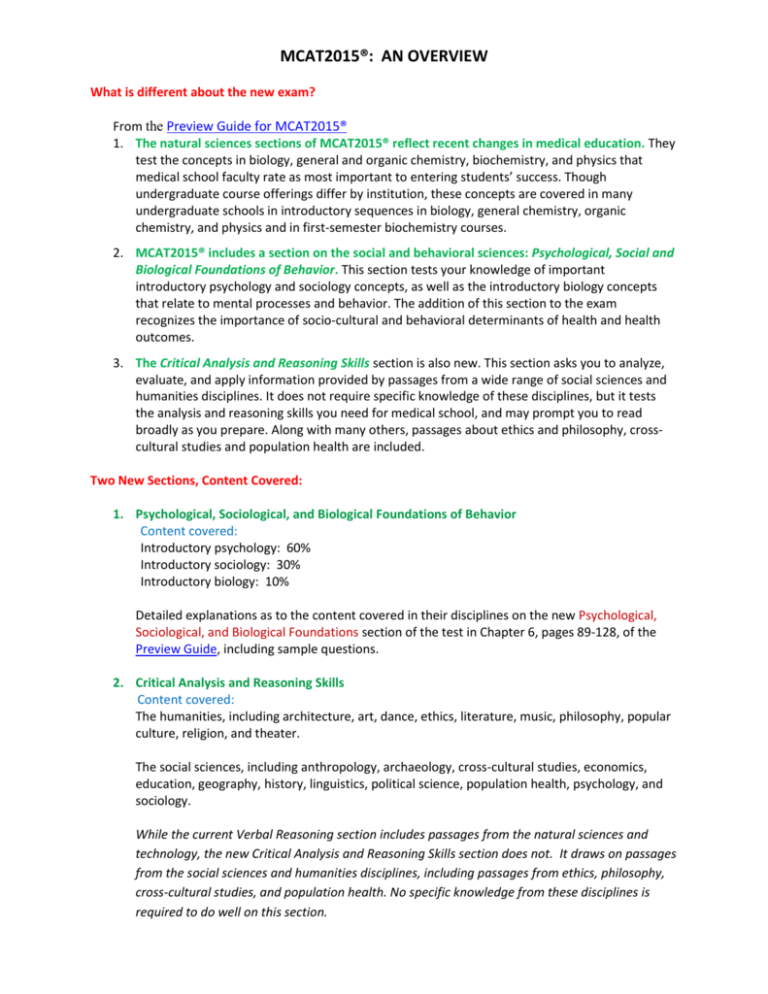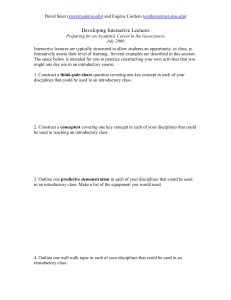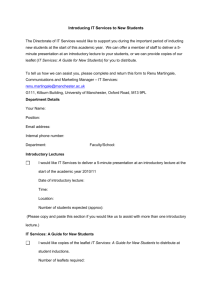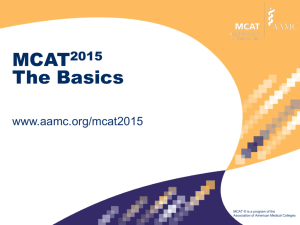mcat2015®: an overview - Homewood Student Affairs
advertisement

MCAT2015®: AN OVERVIEW What is different about the new exam? From the Preview Guide for MCAT2015® 1. The natural sciences sections of MCAT2015® reflect recent changes in medical education. They test the concepts in biology, general and organic chemistry, biochemistry, and physics that medical school faculty rate as most important to entering students’ success. Though undergraduate course offerings differ by institution, these concepts are covered in many undergraduate schools in introductory sequences in biology, general chemistry, organic chemistry, and physics and in first-semester biochemistry courses. 2. MCAT2015® includes a section on the social and behavioral sciences: Psychological, Social and Biological Foundations of Behavior. This section tests your knowledge of important introductory psychology and sociology concepts, as well as the introductory biology concepts that relate to mental processes and behavior. The addition of this section to the exam recognizes the importance of socio-cultural and behavioral determinants of health and health outcomes. 3. The Critical Analysis and Reasoning Skills section is also new. This section asks you to analyze, evaluate, and apply information provided by passages from a wide range of social sciences and humanities disciplines. It does not require specific knowledge of these disciplines, but it tests the analysis and reasoning skills you need for medical school, and may prompt you to read broadly as you prepare. Along with many others, passages about ethics and philosophy, crosscultural studies and population health are included. Two New Sections, Content Covered: 1. Psychological, Sociological, and Biological Foundations of Behavior Content covered: Introductory psychology: 60% Introductory sociology: 30% Introductory biology: 10% Detailed explanations as to the content covered in their disciplines on the new Psychological, Sociological, and Biological Foundations section of the test in Chapter 6, pages 89-128, of the Preview Guide, including sample questions. 2. Critical Analysis and Reasoning Skills Content covered: The humanities, including architecture, art, dance, ethics, literature, music, philosophy, popular culture, religion, and theater. The social sciences, including anthropology, archaeology, cross-cultural studies, economics, education, geography, history, linguistics, political science, population health, psychology, and sociology. While the current Verbal Reasoning section includes passages from the natural sciences and technology, the new Critical Analysis and Reasoning Skills section does not. It draws on passages from the social sciences and humanities disciplines, including passages from ethics, philosophy, cross-cultural studies, and population health. No specific knowledge from these disciplines is required to do well on this section. Two Revised Sections, Content Covered: 1. Biological and Biochemical Foundations of Living Systems (formerly Biological Sciences) Content covered: First-semester biochemistry: 25% Introductory biology: 65% General chemistry: 5% Organic chemistry: 5% Detailed explanations as to the content covered in their disciplines on the revised Biological and Biochemical Foundations section of the test in Chapter 4, pages 20-58, of the Preview Guide, including sample questions. 2. Chemical and Physical Foundations of Biological Systems (formerly Physical Sciences) Content covered: First –semester biochemistry: 15% Introductory biology: 5% General chemistry: 30% Organic chemistry: 25% Introductory physics: 25% Detailed explanations as to the content covered in their disciplines on the revised Chemical and Physical Foundations section of the test in Chapter 5, pages 59-88, of the Preview Guide, including sample questions. New Content; By Subject Area: Biochemistry—material typically covered in a first-semester biochemistry class Research methods and statistics concepts—typically taught in introductory science classes Psychology and Sociology—typically taught in one-semester introductory psychology and onesemester introductory sociology classes; medical schools want applicants to understand “the psychological and socio-cultural determinants of health.” This will include questions on the “knowledge of the ways in which psychological, social, and biological factors influence perceptions and reactions to the world; behavior and behavior change; what people think about themselves and others; the cultural and social differences that influence well-being; and the relationships between social stratification, access to resources, and well-being.” Mental processes and behavior content—typically taught in introductory biology Ethics, philosophy, cross-cultural studies, and population health content—gleaned from reading widely across many disciplines. No specific courses are recommended to prepare for this. All the content examinees will need are contained in the passages. Scientific and Reasoning Skills—including knowledge of scientific concepts and principles, scientific reasoning and evidence-based problem solving, reasoning about the design and execution of research, and data-based and statistical reasoning 11/2013








